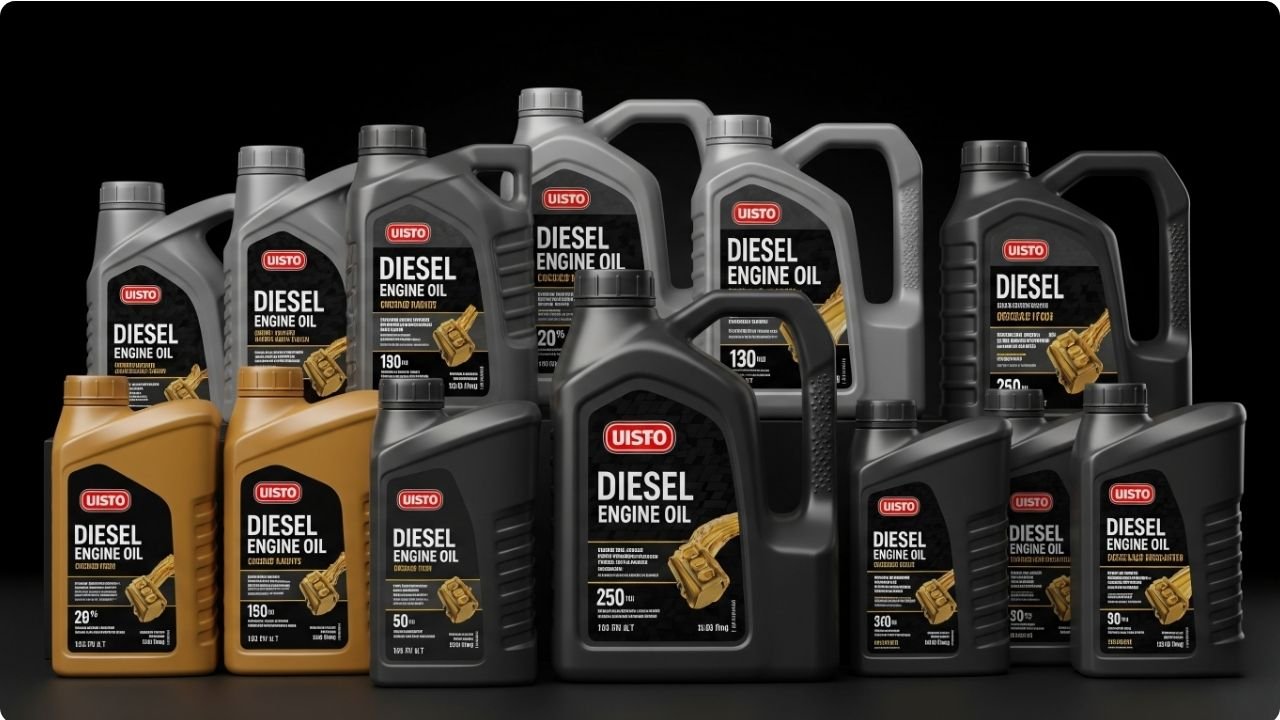Guide to Car Oil for Diesel Engines

Ever been on a long road trip with a diesel engine humming like a beast under your hood? I have. I still remember my first old-school Toyota Hilux — a grumbling workhorse that drank car oil for diesel engines like a morning cup of tea. It wasn’t just fuel that kept that thing alive; it was the right oil that made all the difference. I learned the hard way how oil could either be your best friend or your worst enemy.
Car oil for diesel engines isn’t just “motor oil” with a different label. It’s uniquely crafted to handle the heat, soot, and pressures of a diesel powerhouse. Diesel engines run hotter, work harder, and need oil that steps up to the challenge. In this article, I’ll take you on a journey — not just technical, but personal. You’ll learn how the right oil can extend the life of your engine, improve performance, and save you a small fortune in repairs.
Let’s unpack the secrets behind diesel engine oil and why it deserves more attention than it gets.
Why Diesel Engines Need a Different Kind of Oil
Diesel engines aren’t just gas engines with an attitude. They function differently — higher compression ratios, more torque, and more stress on internal parts. The result? More heat, more soot, more combustion byproducts. That means regular oil just won’t cut it.
Here’s what makes car oil for diesel engines so special:
- Detergents and dispersants: These help clean and suspend soot so it doesn’t settle in your engine.
- Higher viscosity: Diesel oils are usually thicker, offering better protection under heavy loads.
- Zinc and phosphorus additives (ZDDP): These reduce wear, especially in older engines.
- Stronger TBN (Total Base Number): Keeps acids in check, especially useful for engines with EGR systems.
Let me tell you about a buddy of mine. He once used regular gasoline engine oil in his diesel SUV — big mistake. Within 5,000 km, he had turbo issues and a clogged EGR. It cost him over $700 to fix. Moral of the story? The right oil matters. Don’t try to save a buck on oil — it’ll cost you later.
Key Features of Diesel-Specific Engine Oil
When shopping for car oil for diesel engines, don’t just grab the first jug you see on sale. Here’s what to look for:
Viscosity Rating
Most diesel engines prefer 15W-40 or 5W-40. These provide the thickness needed at high temps but also flow during cold starts.
API Classification
Look for API CK-4 or CJ-4 ratings. These standards ensure compatibility with modern diesel emissions systems and fuel types.
ACEA Ratings (for Europe-based vehicles)
For European diesel cars, you might need ACEA C3, E9, or E6 — always check your manual.
Synthetic vs Conventional
- Synthetic diesel oil offers better high-temp stability, fuel economy, and cold weather performance.
- Conventional oil is cheaper and still effective for older engines or warm climates.
Table: Diesel vs Gasoline Oil Comparison
| Feature | Diesel Engine Oil | Gasoline Engine Oil |
|---|---|---|
| Detergent Additives | High | Low to Moderate |
| Viscosity (Common) | 15W-40, 5W-40 | 5W-30, 10W-30 |
| Soot Handling | Excellent | Poor |
| Wear Protection (ZDDP) | Higher | Moderate |
| Emission System Friendly | Yes (API CK-4) | Not Always |
| Cost | Slightly Higher | Lower |
How Often Should You Change Diesel Engine Oil?
Here’s where it gets a bit tricky. Unlike gas engines, diesel motors create more soot and byproducts — even when they’re running great. That means they can dirty oil faster.
General rule of thumb:
- For light-duty diesels (like pickups or SUVs): every 5,000 to 7,500 miles (8,000 to 12,000 km).
- For heavy-duty or turbo diesels: every 3,000 to 5,000 miles (4,800 to 8,000 km).
But don’t just rely on numbers. Pay attention to:
- Driving conditions: Lots of towing? More frequent oil changes.
- Oil color: If it turns black fast, it’s doing its job. But gritty, sludgy oil is a warning sign.
- Dashboard alerts: Trust your oil life monitor, if your vehicle has one.
I usually change my diesel oil every 5,000 km religiously. A few years ago, I got lazy and stretched it to 9,000. The engine started idling rough, and fuel economy dropped. Once I changed the oil, it felt like breathing fresh air again.
Choosing the Right Oil Brand: What Mechanics (and I) Recommend
Let’s face it — brand loyalty runs deep. But some oils really do outshine others for diesel engines. Based on personal use, feedback from mechanics, and online reviews, here are my top picks:
Shell Rotella T6
A synthetic 5W-40 oil with high resistance to heat and breakdown. Loved by truckers and off-roaders.
Mobil Delvac 1300 Super
Great for older diesels and fleet vehicles. High detergent content, good price.
Valvoline Premium Blue
Co-engineered with Cummins — if that’s not a seal of approval, I don’t know what is.
Amsoil Heavy Duty
Top-tier synthetic oil. A bit pricey, but excellent for extreme climates.
Always make sure the oil bottle clearly says for diesel engines. If it just says “gasoline engines” or doesn’t show an API CK-4 or CJ-4 rating, skip it.
How to Know You’re Using the Wrong Oil (And What It Feels Like)
Imagine this: You’ve just changed your oil, but your engine sounds rougher than before. Maybe it cranks longer during cold starts. Maybe your fuel economy drops, or you notice smoke from the exhaust. That’s your engine’s way of crying out, “Wrong oil, buddy!”
Using the wrong car oil for diesel engines can cause:
- Hard starts in winter
- Loss of power and throttle response
- Increased engine wear and noise
- Excessive oil consumption
- Turbocharger damage
A friend of mine once bought a secondhand diesel van. The seller proudly said it had “fresh oil,” but didn’t mention it was 10W-30 meant for gas engines. Within a week, the van smoked like a chimney and gulped fuel like a trucker at a rest stop. One flush and a proper CK-4 rated 15W-40 later — it ran quieter and smoother. Lesson learned: if something feels off, it probably is.
DIY Guide: How to Change Diesel Engine Oil (Without a Mess)
Changing car oil for diesel engines isn’t rocket science, but it does require a few tweaks compared to gas engines.
What You’ll Need:
- Proper diesel-rated oil (check your manual for quantity and grade)
- New oil filter (diesel filters are often larger)
- Oil catch pan (diesels usually have larger oil capacities — 7 to 15 quarts)
- Funnel, gloves, socket wrench, and a rag
Step-by-Step:
- Warm up the engine for 5 minutes — it helps drain the oil faster.
- Place your drain pan, remove the oil drain plug, and let the old oil flow.
- While draining, unscrew the oil filter and let it drain too.
- Install the new filter (lightly oil the gasket before installing).
- Reinstall the drain plug and pour in the new oil using a funnel.
- Start the engine for 30 seconds, shut off, and check the oil level. Top up if needed.
- Dispose of the used oil at your nearest recycling station.
Pro tip: Diesel oil turns black fast — that’s normal! It means it’s doing its job by suspending soot. Don’t panic.
Cold Climates and Diesel Oil: What You Need to Know
If you live where winters bite hard, your car oil for diesel engines needs to perform under pressure — literally. Cold weather thickens oil, making it harder for your engine to start and circulate oil quickly.
That’s why in colder areas, many diesel owners switch to synthetic 5W-40 oil. The “5W” rating means it flows better at low temps, protecting your engine right from the first crank.
I used to live up north where mornings were -10°C or worse. Switching from 15W-40 conventional to a synthetic 5W-40 made cold starts much easier. It was like putting on warm socks before stepping into snow.
The Environmental Side of Diesel Oil
Let’s be honest. Diesel engines — even with the cleanest oil — aren’t saints when it comes to the environment. But using the right car oil for diesel engines can still make a difference.
Low-ash oils designed for DPF (Diesel Particulate Filter) systems help reduce emissions. They also prevent clogging in exhaust filters — a common issue that leads to forced regens or costly replacements.
Also, used diesel oil contains heavy metals and chemicals. So always dispose of it properly. Dumping it in a drain or field isn’t just illegal — it poisons the soil and water for generations.
Drop it off at a local recycling center or auto parts store that accepts used oil. Most places will take it for free, especially if you bring it in the original container.
FAQs: Answers You Actually Need
1. Can I use gasoline engine oil in my diesel car?
Nope! Diesel engines need oil with special detergents and additives. Using gas oil can clog filters, damage turbos, and increase wear.
2. Is synthetic oil better for diesel engines?
In most cases, yes. It flows better in cold temps, resists breakdown under heat, and protects longer. But some older engines do better with conventional oil.
3. How much oil does a diesel engine take?
Depends on the engine size. A small diesel car may take 5–7 quarts, while a heavy-duty truck may need 12–15 quarts. Always check your manual.
4. Why does diesel engine oil turn black so quickly?
Diesel engines produce more soot. Good oil captures that soot — so black oil means it’s working, not necessarily dirty.
5. Can I use 5W-30 in my diesel engine?
Only if your owner’s manual allows it. Most diesel engines prefer thicker oils like 15W-40 or 5W-40 for better protection.
6. What’s the best oil brand for diesel engines?
Top choices include Shell Rotella T6, Mobil Delvac, Valvoline Premium Blue, and Amsoil.
7. How often should I change diesel oil?
Generally every 5,000 to 7,500 miles (8,000 to 12,000 km) — but check your specific engine’s needs and driving habits.
8. Does diesel oil expire?
Yes. Even sealed oil can degrade over time. Try to use it within 2–3 years of purchase and always store it in a cool, dry place.
Final Thoughts: Respect the Oil, Respect the Engine
If you’ve made it this far, then here’s the truth: Car oil for diesel engines is more than just a bottle on a shelf. It’s a lifeline. It’s what keeps your hard-working engine breathing strong, mile after mile.
Take care of your diesel, and it’ll take care of you. Use the right oil, change it on time, and don’t cut corners. Whether you’re towing, cruising, or just commuting — make your engine feel like it’s running on silk.
Diesel engines are loyal beasts. Treat them right — and they’ll outlive everything else on the road.






